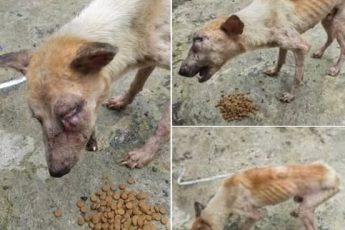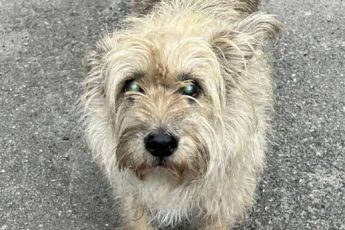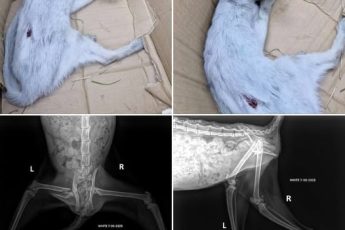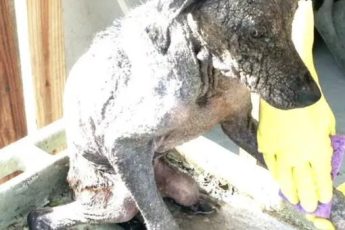In every town, there’s always one such dog.
No address, no name tag on a bowl, no vaccinations, no right to a warm blanket.
A dog no one ever owned — yet everyone recognizes.
He appears suddenly — first like a ghost, a silent shadow near a kiosk, a trash bin, or a bus stop.
And then, like part of everyday life.
As if he had always been there.
That’s who Piatnyshko became.
No one waited for him.
No one called for him.
He simply appeared.
And stayed.
He came at a moment when it seemed all hope had left his body.
Covered in dirt, paws scraped, his eyes far too empty for a dog.
He didn’t growl.
He didn’t whimper.
He didn’t beg.
He just curled up, as if the world had permanently closed its doors to him.
He didn’t know kind hands — only blows.
He didn’t know food bowls — only kicks at the dumpsters.
He didn’t know play — only cold ground beneath his belly.
There was so much fear in him, even the wind made him tremble.
But someone noticed.
First, an old woman who left him some porridge scraps each evening.
Then a guy from the car wash who once said, “Hey, Piatnyshko, come with me.”
Then — school kids who threw him part of a sandwich.
Then — a pastor who fed him after Mass.
Then — a little girl with braids who started leaving a teddy bear for him by her door.
And suddenly, the whole street knew: Piatnyshko was ours.
Not one person’s.
All of ours.
He became a symbol of something very simple and deeply human:
Kindness.
The kind that needs no explanation — only feeling.
He was at every fair, every holiday, every church door.
He greeted children, followed the marching band, lay down by the feet of the elderly.
No one taught him to be kind.
He just was kindness.
Years passed.
Piatnyshko grew old.
His ears no longer twitched at every sound.
He slept longer, walked slower.
His eyes grew dim.
And one day, he simply didn’t get up.
He lay in the same place — by the blue-walled house, where he always waited for his bowl.
He didn’t cry.
Just looked at the sky.
And then something happened — something no words can capture without trembling.
People gathered.
Many people.
Everyone who had ever petted him.
Who had shared lunch with him.
Who laughed when he barked at the parade.
Who whispered into his ear, “You’re a good boy, Piatnyshko.”
They came — not to say goodbye.
But to say thank you.
Someone brought a small coffin.
Another lined it with white cloth.
Someone placed his favorite ball inside.
Someone found a marching band.
Someone brought flowers.
It was a real farewell.
Not staged.
But from the heart.
The street fell silent.
Even those who didn’t know his name stopped when they saw the procession.
At the front walked a boy with a wheelbarrow holding the white coffin.
Behind him — children with flowers.
Then — a brass band.
And after them — hundreds of people.
Some were silent.
Some cried.
Some smiled — through pain and gentle memory.
Because this was not just a dog.
This was the soul of the town.
The farewell lasted all day.
Piatnyshko was seen off like a loved one.
People shared words of gratitude, stories, memories.
Someone even said for the first time:
“That dog once pulled me out of depression. Just by lying next to me when I was at my worst.”
He was buried within the churchyard walls, right where he used to lie in the shade by the entrance.
Above the coffin, they placed an icon of Christ.
Flowers were set beside it.
A little girl came up last.
She held a ball — just like the one buried with him.
She placed it gently down and whispered:
“We’ll play again… when we meet.”
No one held back tears.
Since then, someone always comes to visit each morning.
They bring fresh flowers.
Say a prayer.
Share the day’s news.
Piatnyshko is gone.
But he stayed.
He stayed in children’s laughter.
In the quiet steps of the old woman still bringing porridge.
In the music of the brass band that plays on holidays.
In the hands that now reach more willingly to pet other dogs.
And if one day you find yourself in that village — and you’re met with warm, unfamiliar smiles — know this:
It’s because, once upon a time, one dog taught them how to be truly human.





